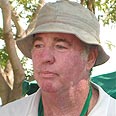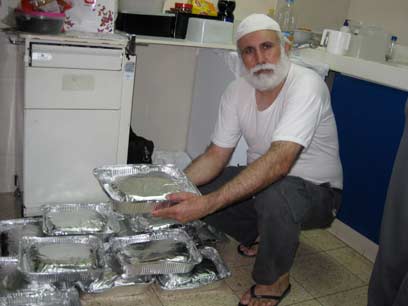
Bereaved father transports ailing Palestinians to Israeli hospital
Buma Inbar, whose son was killed in Lebanon, helps transfer Gazans in life-threatening condition to hospital just outside Tel Aviv. 'Leaders from both sides don’t care about people,' he says, 'I feel I’m doing the peace.' Palestinian patient's negative opinion of Israelis hasn't changed: 'Ask me how I feel when we have electricity and water in Gaza'
TEL AVIV - It’s 5 pm on a recent Thursday and Buma Inbar has spent an hour chatting with pediatric doctors at Chaim Sheba Medical Center at Tel Hashomer, outside Tel Aviv. The bearish 64-year-old former paratrooper wanders down a brightly lit corridor in the cancer ward and spies Hamuda Narem al-Fara sitting in the same chair the Gaza sheikh has occupied for weeks while his four-month-old grandson receives successive treatments for a gastro-intestinal disorder.
The baby is an exception. Dozens of the other children who have occupied adjoining rooms at the hospital in the past three years were picked up and taken there by Inbar, riding in the back seat of his beat-up white Mitsubishi Sedan.
Inbar, who lost his oldest son to fighting in Lebanon in 1995, calls out a greeting in Arabic and the white-bearded sheikh walks up and clasps him in a tight embrace, each kissing the other’s cheeks in a warm greeting. Al-Fara shows him a donated stack of tin-foiled dinners he will serve when he breaks the Ramadan fast.

'Treated with compassion.' Palestinian mother and son at Chaim Sheba hospital (Photo: Anne Usher)
This year, there were fewer recipients. Until July, about 65 children and teens from Gaza occupied the beds here, sharing the corridors with Israeli children. Now just 20 remain and there will be “much fewer” in the next several weeks, predicts Raied Baloum, a social worker who coordinates Gaza patients’ stays at the hospital.
More are being denied from entering Israel at a time when hospitals in Gaza are buckling under a shortage of medical equipment, drugs and trained doctors, according to the World Health Organization. Many of those who do get through are now being sent elsewhere by the Palestinian Authority.
Largely as a cost savings measure, it has referred more than 900 patients to Egypt since the Rafah crossing opened in June. That month, it stopped paying for the treatment of all Palestinians at the hospital in Tel Hashomer, Baloum said.
Gaza patients are also now being sent to Palestinian-run hospitals in east Jerusalem and the West Bank and a handful of other Israeli hospitals, where they are expected to have shorter and less expensive stays.
Baloum notes that at Chaim Sheba, children are first run through a battery of tests because many have been misdiagnosed by doctors in Gaza. Most are suffering from cancer and heart disease.
'So close and yet so far'
Gaza’s only children’s hospital has 300 cancer patients, but only 15 beds, said Dr. El Alul, its deputy manager and one of only three pediatric oncologists there.
“It’s getting worse,” said Alul. He is one of six Gaza doctors being trained at Chaim Sheba and other Israeli hospitals as part of a program run by the Peres Center for Peace. Virtually all other exit permits for such training have been blocked during the blockade.
Before the blockade, “we had enough drugs and it was easier because we dealt with the Israeli Health Ministry,” he said. “There was a better chance to be trained and refer patients to Israeli hospitals, and we had access to equipment.”
Israel has since allowed only patients facing life-threatening conditions to cross its border. Children must be accompanied by a family member, and that person is subjected to extensive screening, often including interviews by its security service, the Shin Bet.
Before this summer, Israeli officials rejected about 2% of the roughly 1,000 Gaza patients a month seeking treatment outside the territory, said Physicians for Human Rights, an Israeli medical organization that advocates for these patients. Since May, this has risen to about 12%.
The Palestinian Authority ultimately decides where each will be sent, and pays for their care out of an Israeli government account of Palestinian money that it has collected in value-added taxes.
The Palestinian Health Ministry said it is saving money by keeping patients away from the Chaim Sheba medical center, where leukemia patients are usually hospitalized for six to eight months. Those at the highest risk of dying are often kept for a year.
“This costs millions,” said the Palestinian Health Ministry's general director, Dr. Muhammed al-Kashif. He also accused it of keeping alive patients with no prospects of survival.
Patients needing emergency treatment will still be sent to Israel, he said, but most funds will now go to Palestinian hospitals instead. He added he thinks patients prefer to be in the hands of fellow Palestinians.
Pediatric doctors at the Chaim Sheba Medical Center disagree and express concern that children’s health will be compromised.
“They are treated with compassion, as if they were our sons,” said Dr. Raz Somech, director of the pediatric department and its immunology center, which he says is the only one in the region. “Tel Hashomer must make its best efforts to bring our patients back. It’s ridiculous.”

Gaza sheikh al-Fara with donated tin-foiled dinners for patients (Photo: Anne Usher)
He said he is getting 50 calls a day from parents of children who are back in Gaza and face difficulties following instructions for after-care or have been rejected from returning for further treatment or surgery. “Sometimes we know if we send them home they will die.”
Until he left several weeks ago, Ahmed Rian was one of the “million dollar” patients. Inbar picked him and his father, Riyad, up at the Erez crossing about a year ago after the 16-year-old was diagnosed with Hodgkin’s disease. Riyad donated his blood, but a month and a half later, the cancer returned.
In July, after rounds of chemotherapy, he stood quietly next to his father as they greeted Inbar in a lobby filled with colorful animal murals. That Friday, as he always does, Inbar had driven a circuit of restaurants to pick up food for Riyad, who, like other patients’ relatives, was confined to the hospital for the entire duration of his son’s stay and slept by his side.
He was sent home in August with instructions to return soon for further treatment. Palestinian officials plan to send him to Ichilov Hospital instead, where they have just sent his older brother, Nashad, who also has the disease.
Riyad complained about the decision to send the boys to Tel Aviv's Sourasky Medical Center, saying the doctor at Chaim Sheba was “gold” and has all of Ahmed’s paperwork.
Unlike Ahmed, Rim al-Masri’s family has a connection to the ministry’s office in Gaza and she is expected to return to Chaim Sheba soon. She is awaiting a bone marrow transplant from her sister after undergoing surgery to close a hole in her heart.
Heavy-lidded and reed thin, she looked far younger than her 17 years in July, before her surgery.
“I was scared both to come to here and to have the surgeries,” she said then, adding she missed her three brothers and four sisters at home.
A group of volunteers, Orthodox Jews and their children, wheeled food down her corridor that night and she rose from her bed, dressed and wearing a headscarf, to receive it. Despite this and her doctor’s care, Rim’s negative opinion of Israelis has not changed. Her father, who worked in Israel before the blockade, is more charitable. Rim said half of the children in her extended family were killed during the 2008-2009 war.
“Ask me when we have electricity and water,” she said.
“Leaders from both sides – they don’t care about people,” said Buma. “I feel I’m doing the peace."
This year, he secured permission for a handful of the Gaza patients to join one of his annual visits for 1,400 boys from the West Bank to the turquoise waters off Jaffa on the Israeli coast. He was inspired when a boy there once told him it was his dream to see the ocean – just an hour’s drive away.
“So close and so far,” he said.
His wife, he said, has accused him of caring more for the Palestinians – who killed his son – than his own people.
He grew especially close to Hassan As-Saleya, a gravely ill four year old, as he frequently sat by the boy’s bedside during the year he was at Chaim Sheba. His father, initially barred from Israel for security reasons, was allowed in for several days after Inbar told Shin Bet contacts that doctors expected the boy to die soon. He was forced to return a day before Hassan succumbed, on a Friday. When the staff refused to drive his body to the Gaza border in an ambulance on the holy day, Inbar persuaded them to let him drive the boy’s body to the border so his family could immediately bury him, in keeping with Muslim practice.
“I wanted to hug Hassan’s mother when I gave her the body, but I didn’t want to offend her, so I just put my hand on his back.” His expression softens. He notes she became pregnant six months later and had a little girl.
On Tuesday, he made his weekly visit to Yotam’s grave in a soldiers' cemetery outside Tel Aviv. About 20 feet away is the grave of son’s best friend, Itay Shahal, who committed suicide just days after Yotam’s death.
“I wonder sometimes what he would think about what I’m doing,” Inbar said. “I know he would be proud.”
- Follow Ynetnews on Facebook










